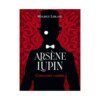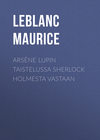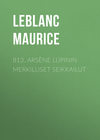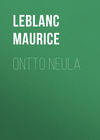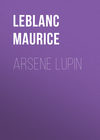Kitabı oku: «The Golden Triangle: The Return of Arsène Lupin», sayfa 10
CHAPTER X
THE RED CORD
Coralie, feeling her legs give way beneath her, had flung herself on the prie-dieu and there knelt praying fervently and wildly. She could not tell on whose behalf, for the repose of what unknown soul her prayers were offered; but her whole being was afire with fever and exaltation and the very action of praying seemed able to assuage her.
"What was your mother's name, Coralie?" Patrice whispered.
"Louise," she replied.
"And my father's name was Armand. It cannot be either of them, therefore; and yet."
Patrice also was displaying the greatest agitation. Stooping down, he examined the nineteen wreaths, renewed his inspection of the tombstone and said:
"All the same, Coralie, the coincidence is really too extraordinary. My father died in 1895."
"And my mother died in that year too," she said, "though I do not know the exact date."
"We shall find out, Coralie," he declared. "These things can all be verified. But meanwhile one truth becomes clear. The man who used to interlace the names of Patrice and Coralie was not thinking only of us and was not considering only the future. Perhaps he thought even more of the past, of that Coralie and Patrice whom he knew to have suffered a violent death and whom he had undertaken to avenge. Come away, Coralie. No one must suspect that we have been here."
They went down the path and through the two doors on the lane. They were not seen coming in. Patrice at once brought Coralie indoors, urged Ya-Bon and his comrades to increase their vigilance and left the house.
He came back in the evening only to go out again early the next day; and it was not until the day after, at three o'clock in the afternoon, that he asked to be shown up to Coralie.
"Have you found out?" she asked him at once.
"I have found out a great many things which do not dispel the darkness of the present. I am almost tempted to say that they increase it. They do, however, throw a very vivid light on the past."
"Do they explain what we saw two days ago?" she asked, anxiously.
"Listen to me, Coralie."
He sat down opposite her and said:
"I shall not tell you all the steps that I have taken. I will merely sum up the result of those which led to some result. I went, first of all, to the Mayor of Passy's office and from there to the Servian Legation."
"Then you persist in assuming that it was my mother?"
"Yes. I took a copy of her death-certificate, Coralie. Your mother died on the fourteenth of April, 1895."
"Oh!" she said. "That is the date on the tomb!"
"The very date."
"But the name? Coralie? My father used to call her Louise."
"Your mother's name was Louise Coralie Countess Odolavitch."
"Oh, my mother!" she murmured. "My poor darling mother! Then it was she who was murdered. It was for her that I was praying over the way?"
"For her, Coralie, and for my father. I discovered his full name at the mayor's office in the Rue Drouot. My father was Armand Patrice Belval. He died on the fourteenth of April, 1895."
Patrice was right in saying that a singular light had been thrown upon the past. He had now positively established that the inscription on the tombstone related to his father and Coralie's mother, both of whom were murdered on the same day. But by whom and for what reason, in consequence of what tragedies? This was what Coralie asked him to tell her.
"I cannot answer your questions yet," he replied. "But I addressed another to myself, one more easily solved; and that I did solve. This also makes us certain of an essential point. I wanted to know to whom the lodge belonged. The outside, in the Rue Raynouard, affords no clue. You have seen the wall and the door of the yard: they show nothing in particular. But the number of the property was sufficient for my purpose. I went to the local receiver and learnt that the taxes were paid by a notary in the Avenue de l'Opéra. I called on this notary, who told me."
He stopped for a moment and then said:
"The lodge was bought twenty-one years ago by my father. Two years later my father died; and the lodge, which of course formed part of his estate, was put up for sale by the present notary's predecessor and bought by one Siméon Diodokis, a Greek subject."
"It's he!" cried Coralie. "Siméon's name is Diodokis."
"Well, Siméon Diodokis," Patrice continued, "was a friend of my father's, because my father appointed him the sole executor of his will and because it was Siméon Diodokis who, through the notary in question and a London solicitor, paid my school-fees and, when I attained my majority, made over to me the sum of two hundred thousand francs, the balance of my inheritance."
They maintained a long silence. Many things were becoming manifest, but indistinctly, as yet, and shaded, like things seen in the evening mist. And one thing stood in sharper outline than the rest, for Patrice murmured:
"Your mother and my father loved each other, Coralie."
The thought united them more closely and affected them profoundly. Their love was the counterpart of another love, bruised by trials, like theirs, but still more tragic and ending in bloodshed and death.
"Your mother and my father loved each other," he repeated. "I should say they must have belonged to that class of rather enthusiastic lovers whose passion indulges in charming little childish ways, for they had a trick of calling each other, when alone, by names which nobody else used to them; and they selected their second Christian names, which were also yours and mine. One day your mother dropped her amethyst rosary. The largest of the beads broke in two pieces. My father had one of the pieces mounted as a trinket which he hung on his watch-chain. Both were widowed. You were two years old and I was eight. In order to devote himself altogether to the woman he loved, my father sent me to England and bought the lodge in which your mother, who lived in the big house next door, used to go and see him, crossing the lane and using the same key for both doors. It was no doubt in this lodge, or in the garden round it, that they were murdered. We shall find that out, because there must be visible proofs of the murder, proofs which Siméon Diodokis discovered, since he was not afraid to say so in the inscription on the tombstone."
"And who was the murderer?" Coralie asked, under her breath.
"You suspect it, Coralie, as I do. The hated name comes to your mind, even though we have no grounds for speaking with certainty."
"Essarès!" she cried, in anguish.
"Most probably."
She hid her face in her hands:
"No, no, it is impossible. It is impossible that I should have been the wife of the man who killed my mother."
"You bore his name, but you were never his wife. You told him so the evening before his death, in my presence. Let us say nothing that we are unable to say positively; but all the same let us remember that he was your evil genius. Remember also that Siméon, my father's friend and executor, the man who bought the lovers' lodge, the man who swore upon their tomb to avenge them: remember that Siméon, a few months after your mother's death, persuaded Essarès to engage him as caretaker of the estate, became his secretary and gradually made his way into Essarès' life. His only object must have been to carry out a plan of revenge."
"There has been no revenge."
"What do we know about it? Do we know how Essarès met his death? Certainly it was not Siméon who killed him, as Siméon was at the hospital. But he may have caused him to be killed. And revenge has a thousand ways of manifesting itself. Lastly, Siméon was most likely obeying instructions that came from my father. There is little doubt that he wanted first to achieve an aim which my father and your mother had at heart: the union of our destinies, Coralie. And it was this aim that ruled his life. It was he evidently who placed among the knick-knacks which I collected as a child this amethyst of which the other half formed a bead in your rosary. It was he who collected our photographs. He lastly was our unknown friend and protector, the one who sent me the key, accompanied by a letter which I never received, unfortunately."
"Then, Patrice, you no longer believe that he is dead, this unknown friend, or that you heard his dying cries?"
"I cannot say. Siméon was not necessarily acting alone. He may have had a confidant, an assistant in the work which he undertook. Perhaps it was this other man who died at nineteen minutes past seven. I cannot say. Everything that happened on that ill-fated morning remains involved in the deepest mystery. The only conviction that we are able to hold is that for twenty years Siméon Diodokis has worked unobtrusively and patiently on our behalf, doing his utmost to defeat the murderer, and that Siméon Diodokis is alive. Alive, but mad!" Patrice added. "So that we can neither thank him nor question him about the grim story which he knows or about the dangers that threaten you."
Patrice resolved once more to make the attempt, though he felt sure of a fresh disappointment. Siméon had a bedroom, next to that occupied by two of the wounded soldiers, in the wing which formerly contained the servants' quarters. Here Patrice found him.
He was sitting half-asleep in a chair turned towards the garden. His pipe was in his mouth; he had allowed it to go out. The room was small, sparsely furnished, but clean and light. Hidden from view, the best part of the old man's life was spent here. M. Masseron had often visited the room, in Siméon's absence, and so had Patrice, each from his own point of view.
The only discovery worthy of note consisted of a crude diagram in pencil, on the white wall-paper behind a chest of drawers: three lines intersecting to form a large equilateral triangle. In the middle of this geometrical figure were three words clumsily inscribed in adhesive gold-leaf:
The Golden Triangle
There was nothing more, not another clue of any kind, to further M. Masseron's search.
Patrice walked straight up to the old man and tapped him on the shoulder:
"Siméon!" he said.
The other lifted his yellow spectacles to him, and Patrice felt a sudden wish to snatch away this glass obstacle which concealed the old fellow's eyes and prevented him from looking into his soul and his distant memories. Siméon began to laugh foolishly.
"So this," thought Patrice, "is my friend and my father's friend. He loved my father, respected his wishes, was faithful to his memory, raised a tomb to him, prayed on it and swore to avenge him. And now his mind has gone."
Patrice felt that speech was useless. But, though the sound of his voice roused no echo in that wandering brain, it was possible that the eyes were susceptible to a reminder. He wrote on a clean sheet of paper the words that Siméon had gazed upon so often:
Patrice and Coralie
14 April, 1895
The old man looked, shook his head and repeated his melancholy, foolish chuckle.
The officer added a new line:
Armand Belval
The old man displayed the same torpor. Patrice continued the test. He wrote down the names of Essarès Bey and Colonel Fakhi. He drew a triangle. The old man failed to understand and went on chuckling.
But suddenly his laughter lost some of its childishness. Patrice had written the name of Bournef, the accomplice, and this time the old secretary appeared to be stirred by a recollection. He tried to get up, fell back in his chair, then rose to his feet again and took his hat from a peg on the wall.
He left his room and, followed by Patrice, marched out of the house and turned to the left, in the direction of Auteuil. He moved like a man in a trance who is hypnotized into walking without knowing where he is going. He led the way along the Rue de Boulainvilliers, crossed the Seine and turned down the Quai de Grenelle with an unhesitating step. Then, when he reached the boulevard, he stopped, putting out his arm, made a sign to Patrice to do likewise. A kiosk hid them from view. He put his head round it. Patrice followed his example.
Opposite, at the corner of the boulevard and a side-street, was a café, with a portion of the pavement in front of it marked out by dwarf shrubs in tubs. Behind these tubs four men sat drinking. Three of them had their backs turned to Patrice. He saw the only one that faced him, and he at once recognized Bournef.
By this time Siméon was some distance away, like a man whose part is played and who leaves it to others to complete the work. Patrice looked round, caught sight of a post-office and went in briskly. He knew that M. Masseron was at the Rue Raynouard. He telephoned and told him where Bournef was. M. Masseron replied that he would come at once.
Since the murder of Essarès Bey, M. Masseron's enquiry had made no progress in so far as Colonel Fakhi's four accomplices were concerned. True, they discovered the man Grégoire's sanctuary and the bedrooms with the wall-cupboards; but the whole place was empty. The accomplices had disappeared.
"Old Siméon," said Patrice to himself, "was acquainted with their habits. He must have known that they were accustomed to meet at this café on a certain day of the week, at a fixed hour, and he suddenly remembered it all at the sight of Bournef's name."
A few minutes later M. Masseron alighted from his car with his men. The business did not take long. The open front of the café was surrounded. The accomplices offered no resistance. M. Masseron sent three of them under a strong guard to the Dépôt and hustled Bournef into a private room.
"Come along," he said to Patrice. "We'll question him."
"Mme. Essarès is alone at the house," Patrice objected.
"Alone? No. There are all your soldier-men."
"Yes, but I would rather go back, if you don't mind. It's the first time that I've left her and I'm justified in feeling anxious."
"It's only a matter of a few minutes," M. Masseron insisted. "One should always take advantage of the fluster caused by the arrest."
Patrice followed him, but they soon saw that Bournef was not one of those men who are easily put out. He simply shrugged his shoulders at their threats:
"It is no use, sir," he said, "to try and frighten me. I risk nothing. Shot, do you say? Nonsense! You don't shoot people in France for the least thing; and we are all four subjects of a neutral country. Tried? Sentenced? Imprisoned? Never! You forget that you have kept everything dark so far; and, when you hushed up the murder of Mustapha, of Fakhi and of Essarès, it was not done with the object of reviving the case for no valid reason. No, sir, I am quite easy. The internment-camp is the worst that can await me."
"Then you refuse to answer?" said M. Masseron.
"Not a bit of it! I accept internment. But there are twenty different ways of treating a man in these camps, and I should like to earn your favor and, in so doing, make sure of reasonable comfort till the end of the war. But first of all, what do you know?"
"Pretty well everything."
"That's a pity: it decreases my value. Do you know about Essarès' last night?"
"Yes, with the bargain of the four millions. What's become of the money?"
Bournef made a furious gesture:
"Taken from us! Stolen! It was a trap!"
"Who took it?"
"One Grégoire."
"Who was he?"
"His familiar, as we have since learnt. We discovered that this Grégoire was no other than a fellow who used to serve as his chauffeur on occasion."
"And who therefore helped him to convey the bags of gold from the bank to his house."
"Yes. And we also think, we know.. Look here, you may as well call it a certainty. Grégoire.. is a woman."
"A woman!"
"Exactly. His mistress. We have several proofs of it. But she's a trustworthy, capable woman, strong as a man and afraid of nothing."
"Do you know her address?"
"No."
"As to the gold: have you no clue to its whereabouts, no suspicion?"
"No. The gold is in the garden or in the house in the Rue Raynouard. We saw it being taken in every day for a week. It has not been taken out since. We kept watch every night. The bags are there."
"No clue either to Essarès' murderer?"
"No, none."
"Are you quite sure?"
"Why should I tell a lie?"
"Suppose it was yourself? Or one of your friends?"
"We thought that you would suspect us. Fortunately, we happen to have an alibi."
"Easy to prove?"
"Impossible to upset."
"We'll look into it. So you have nothing more to reveal?"
"No. But I have an idea.. or rather a question which you will answer or not, as you please. Who betrayed us? Your reply may throw some useful light, for one person only knew of our weekly meetings here from four to five o'clock, one person only, Essarès Bey; and he himself often came here to confer with us. Essarès is dead. Then who gave us away?"
"Old Siméon."
Bournef started with astonishment:
"What! Siméon? Siméon Diodokis?"
"Yes. Siméon Diodokis, Essarès Bey's secretary."
"He? Oh, I'll make him pay for this, the blackguard! But no, it's impossible."
"What makes you say that it's impossible?'"
"Why, because."
He stopped and thought for some time, no doubt to convince himself that there was no harm in speaking. Then he finished his sentence:
"Because old Siméon was on our side."
"What's that you say?" exclaimed Patrice, whose turn it was to be surprised.
"I say and I swear that Siméon Diodokis was on our side. He was our man. It was he who kept us informed of Essarès Bey's shady tricks. It was he who rang us up at nine o'clock in the evening to tell us that Essarès had lit the furnace of the old hothouses and that the signal of the sparks was going to work. It was he who opened the door to us, pretending to resist, of course, and allowed us to tie him up in the porter's lodge. It was he, lastly, who paid and dismissed the men-servants."
"But why? Why this treachery? For the sake of money?"
"No, from hatred. He bore Essarès Bey a hatred that often gave us the shudders."
"What prompted it?"
"I don't know. Siméon keeps his own counsel. But it dated a long way back."
"Did he know where the gold was hidden?" asked M. Masseron.
"No. And it was not for want of hunting to find out. He never knew how the bags got out the cellar, which was only a temporary hiding-place."
"And yet they used to leave the grounds. If so, how are we to know that the same thing didn't happen this time?"
"This time we were keeping watch the whole way round outside, a thing which Siméon could not do by himself."
Patrice now put the question:
"Can you tell us nothing more about him?"
"No, I can't. Wait, though; there was one rather curious thing. On the afternoon of the great day, I received a letter in which Siméon gave me certain particulars. In the same envelope was another letter, which had evidently got there by some incredible mistake, for it appeared to be highly important."
"What did it say?" asked Patrice, anxiously.
"It was all about a key."
"Don't you remember the details?"
"Here is the letter. I kept it in order to give it back to him and warn him what he had done. Here, it's certainly his writing.."
Patrice took the sheet of notepaper; and the first thing that he saw was his own name. The letter was addressed to him, as he anticipated:
"Patrice,
"You will this evening receive a key. The key opens two doors midway down a lane leading to the river: one, on the right, is that of the garden of the woman you love; the other, on the left, that of a garden where I want you to meet me at nine o'clock in the morning on the 14th of April. She will be there also. You shall learn who I am and the object which I intend to attain. You shall both hear things about the past that will bring you still closer together.
"From now until the 14th the struggle which begins to-night will be a terrible one. If anything happens to me, it is certain that the woman you love will run the greatest dangers. Watch over her, Patrice; do not leave her for an instant unprotected. But I do not intend to let anything happen to me; and you shall both know the happiness which I have been preparing for you so long.
"My best love to you."
"It's not signed," said Bournef, "but, I repeat, it's in Siméon's handwriting. As for the lady, she is obviously Mme. Essarès."
"But what danger can she be running?" exclaimed Patrice, uneasily. "Essarès is dead, so there is nothing to fear."
"I wouldn't say that. He would take some killing."
"Whom can he have instructed to avenge him? Who would continue his work?"
"I can't say, but I should take no risks."
Patrice waited to hear no more. He thrust the letter into M. Masseron's hand and made his escape.
"Rue Raynouard, fast as you can," he said, springing into a taxi.
He was eager to reach his destination. The dangers of which old Siméon spoke seemed suddenly to hang over Coralie's head. Already the enemy, taking advantage of Patrice's absence, might be attacking his beloved. And who could defend her?
"If anything happens to me," Siméon had said.
And the supposition was partly realized, since he had lost his wits.
"Come, come," muttered Patrice, "this is sheer idiocy… I am fancying things… There is no reason."
But his mental anguish increased every minute. He reminded himself that old Siméon was still in full possession of his faculties at the time when he wrote that letter and gave the advice which it contained. He reminded himself that old Siméon had purposely informed him that the key opened the door of Coralie's garden, so that he, Patrice, might keep an effective watch by coming to her in case of need.
He saw Siméon some way ahead of him. It was growing late, and the old fellow was going home. Patrice passed him just outside the porter's lodge and heard him humming to himself.
"Any news?" Patrice asked the soldier on duty.
"No, sir."
"Where's Little Mother Coralie?"
"She had a walk in the garden and went upstairs half an hour ago."
"Ya-Bon?"
"Ya-Bon went up with Little Mother Coralie. He should be at her door."
Patrice climbed the stairs, feeling a good deal calmer. But, when he came to the first floor, he was astonished to find that the electric light was not on. He turned on the switch. Then he saw, at the end of the passage, Ya-Bon on his knees outside Coralie's room, with his head leaning against the wall. The door was open.
"What are you doing there?" he shouted, running up.
Ya-Bon made no reply. Patrice saw that there was blood on the shoulder of his jacket. At that moment the Senegalese sank to the floor.
"Damn it! He's wounded! Dead perhaps."
He leapt over the body and rushed into the room, switching on the light at once.
Coralie was lying at full length on a sofa. Round her neck was the terrible little red-silk cord. And yet Patrice did not experience that awful, numbing despair which we feel in the presence of irretrievable misfortunes. It seemed to him that Coralie's face had not the pallor of death.
He found that she was in fact breathing:
"She's not dead. She's not dead," said Patrice to himself. "And she's not going to die, I'm sure of it.. nor Ya-Bon either… They've failed this time."
He loosened the cords. In a few seconds Coralie heaved a deep breath and recovered consciousness. A smile lit up her eyes at the sight of him. But, suddenly remembering, she threw her arms, still so weak, around him:
"Oh, Patrice," she said, in a trembling voice, "I'm frightened.. frightened for you!"
"What are you frightened of, Coralie? Who is the scoundrel?"
"I didn't see him… He put out the light, caught me by the throat and whispered, 'You first… To-night it will be your lover's turn!'.. Oh, Patrice, I'm frightened for you!."

